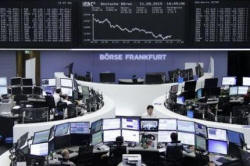|
 Stocks,
yields tumble after China pushes yuan lower again Stocks,
yields tumble after China pushes yuan lower again
 Send a link to a friend
Send a link to a friend
[August 12, 2015]
By Jamie McGeever
LONDON (Reuters) - Markets around the world
fell for a second day on Wednesday, with stocks, the dollar and emerging
market currencies all under pressure after China pushed the yuan lower
again overnight, boosting the appeal of top-rated government bonds.
|
|
 Germany's 2-year yield fell to a new record low of -0.29 percent as
investors feared the deflationary pressures of a slowdown in China -
which devalued its currency on Tuesday - would sap growth around the
rest of the world. Germany's 2-year yield fell to a new record low of -0.29 percent as
investors feared the deflationary pressures of a slowdown in China -
which devalued its currency on Tuesday - would sap growth around the
rest of the world.
The price of industrial commodities such as oil and copper fell
further - copper hit a 6-year low - after the yuan's slump and
reported sub-forecast industrial production and retail sales figures
for July, before rebounding.
The prospect of a U.S. interest rate hike next month dimmed too,
which dragged the dollar and U.S. Treasury yields lower. The flip
side of that was the fifth consecutive daily rise in the price of
gold to a three-week peak.
U.S stock futures indicated Wall Street will open around 1 percent
in the red.
"We had a decent run-up but this is all unwinding pretty quickly. A
competitive devaluation of currencies is never good," Mirabaud
Securities European equity sales executive, Rupert Baker, said.

"I'd be avoiding areas such as carmakers and luxury goods
companies," he said.
The pan-European FTSEurofirst 300 index and the euro zone's
blue-chip Euro STOXX 50 index fell 2 percent, extending Tuesday's
1.7 percent decline.
Germany's DAX and France's CAC 40 <.FCHI> underperformed, both
losing 2.5 percent, as the yuan's slump hit German carmakers and
European luxury goods stocks.
German carmaker BMW and French luxury goods giant LVMH, both big
exporters to China, were down 2.6 percent and 3.4 percent,
respectively.
Britain's FTSE 100 was down 1.2 percent.
YIELDS FALL
On Wednesday, the People's Bank of China (PBOC) set the yuan's
midpoint rate <CNY=SAEC> weaker than Tuesday's closing market rate,
which had already fallen sharply after China devalued its currency
by nearly 2 percent in a surprise move.
The yuan's spot value fell further after Beijing released July
output and investment data, trading as low as 6.4510 to the dollar.
It has fallen nearly 4 percent in two days.
Sources told Reuters that the move to devalue reflects a growing
clamor within Chinese government circles for a weaker yuan - perhaps
up to 10 percent weaker - to help struggling exporters.
MSCI's broadest index of Asia-Pacific shares outside Japan hit
a two-year low, closing down 1.75 percent.
Emerging market currencies from Indonesia to Brazil reeled as
investors feared central banks could rush to weaken their own
currencies in response to China's move.

[to top of second column] |

The U.S. dollar, however, failed to extend its gains against
emerging market currencies across the board, as falling U.S. yields
and Fed rate hike expectations drove it lower.
The euro rose 1 percent above $1.11 for the first time in three
weeks and the dollar fell 0.5 percent against the yen - its biggest
fall in over a month - to 124.40 yen.
The probability of the Federal Reserve raising U.S. interest rates
next month faded to about 40 percent from nearly 60 percent
immediately after last week's solid employment data.
"If the Fed is still intent on raising rates in September ... then
it would suggest that the agenda was being driven by the need to get
off ZIRP (zero interest rate policy) rather than a true evaluation
of the economic outlook," Deutsche Bank strategists said in a note
on Wednesday.
"At this juncture, they should be looking at hawkish quantitative
easing rather than dovish tightening."
The ten-year U.S. Treasury yield fell to 2.045 percent, the
lowest in over three months, and the strong demand for safe-haven
bonds around the world pushed the 2-year German yield to a new low
of minus 0.29 percent.
Commodities investors worried that prolonged yuan weakness could
revive deflationary pressures, with a 19-commodity Thomson
Reuters/Core Commodity CRB Index holding near lows not seen since
2003.

In European trading, however, the weak dollar helped oil and copper
bounce off their lows to claw back some ground, and lifted gold to a
three-week high of $1,119.890 an ounce.
(Additional reporting by Saikat Chatterjee in Hong Kong and Sudip
Kar-Gupta in London; Editing by Louise Ireland; To read Reuters
Global Investing Blog click on http://blogs.reuters.com/globalinvesting;
for the MacroScope Blog click on http://blogs.reuters.com/macroscope;
for Hedge Fund Blog Hub click on http://blogs.reuters.com/hedgehub)
[© 2015 Thomson Reuters. All rights
reserved.] Copyright 2015 Reuters. All rights reserved. This material may not be published,
broadcast, rewritten or redistributed. |